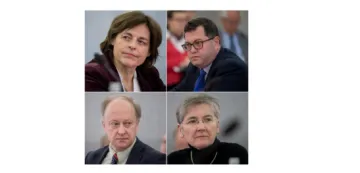Expert Voices: What is Russia up to?

Series of interviews with Arkady Ostrovsky, Marie Mendras, Andrey Kortunov and Judy Dempsey on the current domestic context in Russia and the international implications of the new mandate of Vladimir Putin
Vladimir Putin has renovated his mandate for 6 more years until 2024. However, noticeable signals of mounting problems, growing social discontent, uncertain economic prospects, military interventions abroad and tensions with some neighbors and the West, trigger important questions on whether and how the Kremlin will be able to face these challenges and what international implications will it entail. These and other issues were addressed during the 16th edition of the international seminar War and Peace in the 21st Century, that counted with the participation of Javier Solana, Konstantin Von Eggert, Arkady Ostrovsky, Marie Mendras, Andrey Kortunov, Judy Dempsey, Marc Marginedas and Cristina Gallach.
Stagnation or recovery? Arkady Ostrovsky, Russia and Eastern Europe Editor at The Economist, indicated that Russia’s economic problems cannot be solved through economic means, but political ones.
Is there another Russia beyond the Kremlin and the popular support to President Putin? Marie Mendras, Professor at Sciences Po University’s School of International Affairs and Research Fellow at CNRS in Paris, argued that the regime should be seen through the lens of a “survival mode”, but keeping in mind that survival at home feeds conflicts abroad.
Will there be a substantial change in the main priorities in foreign policy for the new mandate of President Putin? Andrey Kortunov, Director General of the Russian International Affairs Council (RIAC), stated that claiming Russia’s policies as the cause of all of Russia’s problems in the international arena is an oversimplification, because the problem goes deeper than the leadership.
What would be the best approach for the UE when addressing Russia: deterrence or engagement? Judy Dempsey, Senior Fellow at Carnegie Europe and Editor in Chief of Strategic Europe, said that the Kremlin has missed one recent but fundamental point about the EU. In her view, the EU is moving its focus from human rights to stabilization, and the Kremlin should take this on board, as this is a new element of the EU and a drift away from what the EU believes in.